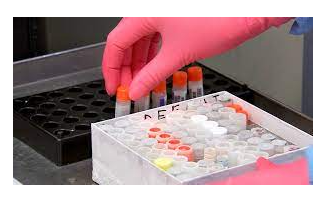During the first trimester, when the overriding pregnancy hormones trouble you with bothersome symptoms and while you are thinking of your child’s growth features, your doctor may suggest a prenatal screening of babies during pregnancy to detect chromosomal abnormalities in the fetus.
Typically done between 11 to 14 weeks of pregnancy, the double marker test plays a significant role in screening neurological defects such as trisomy 18 or Edwards syndrome and trisomy 21 or Down’s Syndrome. This test uses two markers for identification. And so, the name dual or double marker test.
This article explores everything you need to know about the double marker test – its uses, reference values, and indicative cost in India.
In this Article
Double Marker test: What is it?
Double marker test, also known as the maternal serum test, screens the maternal blood for serum levels of specific hormones:
- Free beta human Chorionic Gonadotropin (hCG) and
- Pregnancy-associated Plasma Protein (PAPP-A).
Double marker tests are predictive tests done in the first trimester of pregnancy. Higher or lower levels of the above two markers than normal can help detect the presence of chromosomal aneuploidy.
Typically, a human cell has 23 pairs of chromosomes where 22 pairs are autosomes, and one pair is the sex chromosomes – XX in female fetuses, and XY in male fetuses.
In aneuploids, the number of chromosomes is either more or less than the normal count. Double marker test specifically screens triploids namely:
- Trisomy 21- A condition with an extra copy of chromosome 21. It is also known as Down’s Syndrome.
- Trisomy 18 – A condition with an extra copy of chromosome 18. It is also known as Edwards syndrome.
Ideally, these tests are done between week 11 to week 14 of pregnancy, where the beta hCG levels reach the peak at week 10 of pregnancy and stabilize for the rest of the pregnancy. The PAPP-A levels are also at their optimum levels by week 11.
Another important thing to note here is that these tests alone cannot conclude the presence of a chromosomal anomaly in the baby. Further, ultrasound scans such as Nuchal Translucency Scan examine the clear fluid at the back of the fetal neck and help provide comprehensive results.
Why is the double marker test done?
The possibilities where your doctor can recommend a dual marker test includes:
- If you have a family history of any chromosomal anomalies
- If you have a child with genetic defects
- Maternal age above 35 years as they carry a high risk of having a child with chromosomal abnormalities
- A history of recurrent miscarriages
Also read:- https://pregajunction.com/blog/quadruple-marker-test-in-pregnancy/
Preparations required during the test
With no special preparations required during the test, a double marker test is a simple blood test, where the lab technician draws the blood through a routine blood withdrawal procedure. It requires
- No fasting before the test
- You can carry on with your routine after the test
- Turn around time of the test is around 3 to 7 days
What are the normal beta hCG and PAPP-A ranges? How are the test results interpreted?
The terms “low-risk” or “screen-negative” are considered normal for the tests, meaning there is less likelihood of your baby having a chromosomal defect. The normal range for Beta hCG and PAPP-A in the maternal blood serum are:
- Beta hCG: 25700-288000 mIU/ml for women of all age groups
- PAPP-A: 1 MoM (multiples of median) for women across all age groups
The test readings with higher than normal beta hCG and lower than required PAPP-A signifies – “screen positive” or “high risk”.
- Free Beta hCG, a glycoprotein hormone produced by the placenta during pregnancy, present in higher levels, indicated a greater risk of Trisomy 18 and Down’s syndrome.
- PAPP-A – a low level of this vital plasma protein, indicates a higher risk of Downs syndrome.
The Cost of Double Marker Test in India
The Double Marker Test uses two serum makers to help:
- Assess if the unborn baby is at risk of a mental disorder
- To detect Down syndrome or Trisomy 21 resulting in heart ailments, mental retardation, and other health conditions affecting vital organs.
- Also, to detect Trisomy 18 or Edwards syndrome, causing mental retardation and severe congenital deformities.
The cost of the dual marker test varies based on factors such as the availability of the test in cities (available in selected cities only). The initial indicative price of this test is above INR 2,500 and is subject to variations.
Also read:- https://pregajunction.com/blog/anomaly-scan-in-pregnancy-what-is-it-the-test-results-cost-in-india/
Conclusion
Double Marker Test aka Dual Marker Test aka Maternal Serum Test checks two markers during the first trimester of your pregnancy. The test timing window is between week 11 to week 14 of pregnancy and can detect chromosomal defects such as trisomy 21 and trisomy 18 in the fetus. However, this very safe test result alone cannot confirm the likelihood of the abnormalities in the fetus. Hence, an ultrasound scan or NT test after this test is highly recommended. Talk to your doctor to know more about the test and check on the genetic status of your unborn child.
Reference
Overview | Healthline




